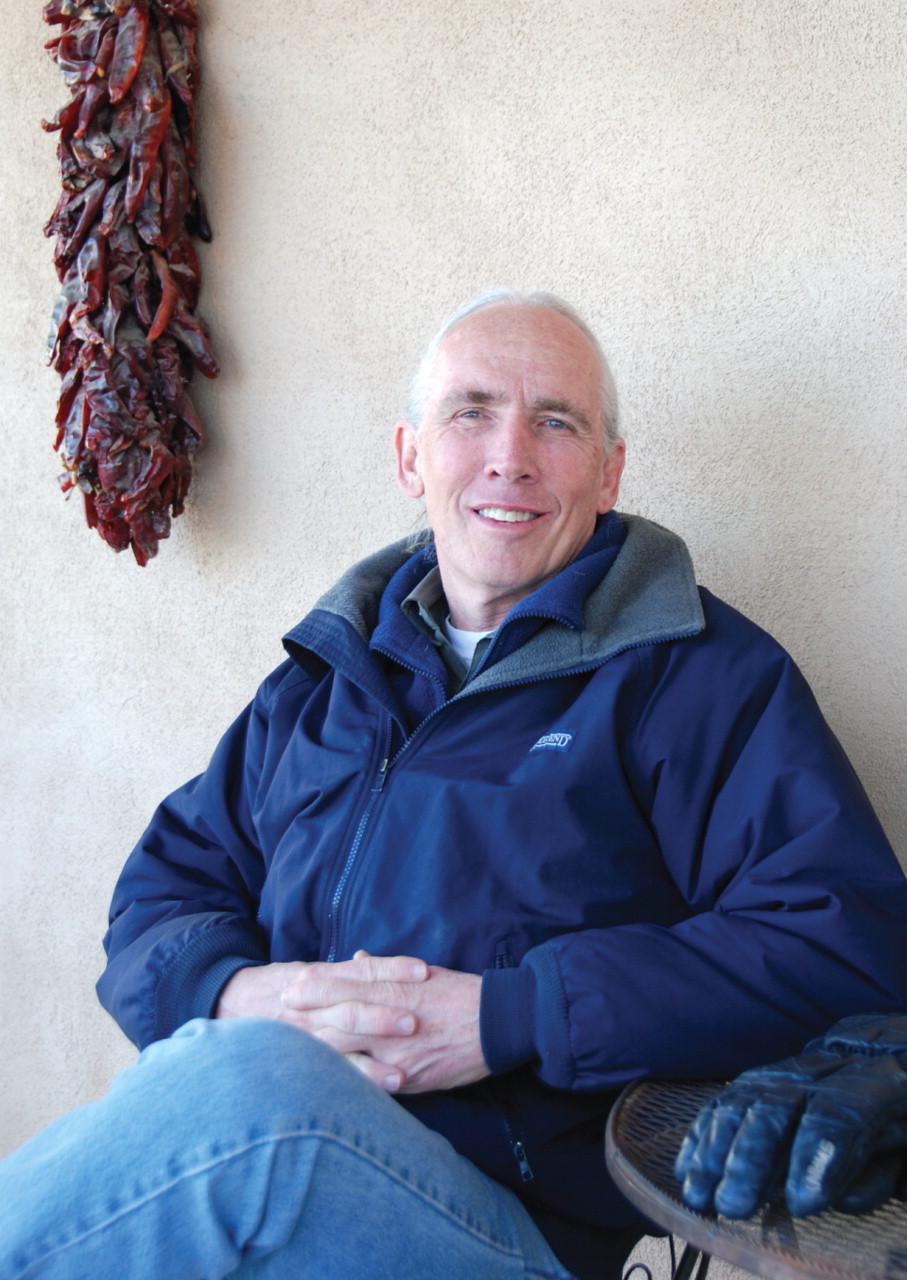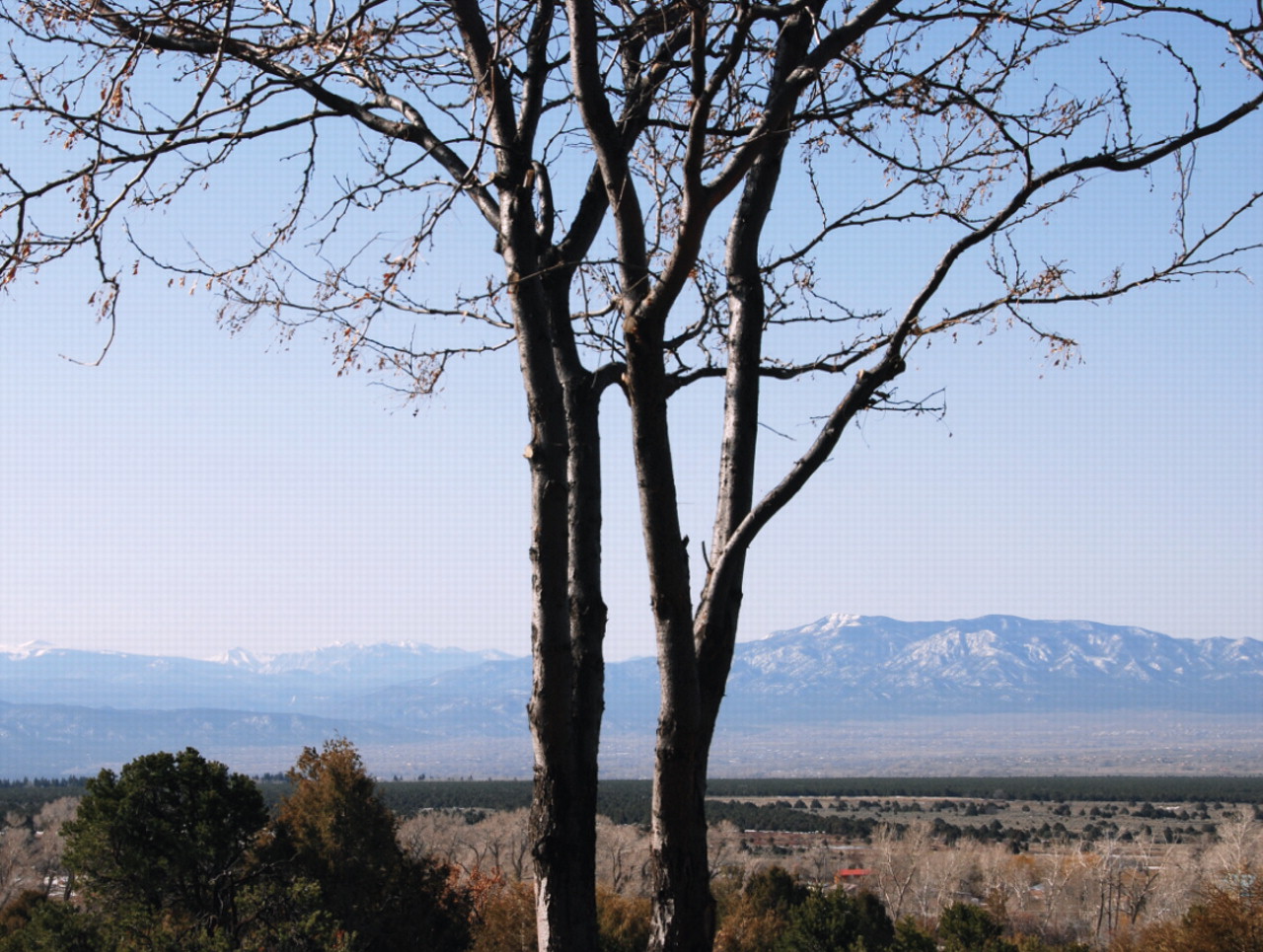Rural Psychiatry Isn't Easy, but Rewards Are Ample
Each morning, psychiatrist Bob Franklin leaves his house in the woods and drives down a dirt road, past the herd of buffalo, to the little crossroads where he sometimes stops for breakfast at Abe's Cantina. Four days a week, he heads straight on to his office in Taos, N.M. But on winter Fridays, he turns right instead of left at the stop sign by the Arroyo Seco Elementary School and follows the winding road up through the steep-sided valley to the ski slopes a dozen miles away.

Psychiatrist Robert Franklin, M.D., M.P.H., relaxes on the porch of a local restaurant in Arroyo Seco, N.M. Franklin balances clinical work at his office in Taos and several other venues with family life—and the occasional day skiing—in the mountains of northern New Mexico.
Credit: Aaron Levin
Attractive as it is, the scenery and the skiing aren't the only reasons that Robert Franklin, M.D., M.P.H., has created a psychiatry practice in rural New Mexico that fills a niche for patients and for himself.
Franklin's career has had its twists and turns like the dirt road from his house. In that way, he reflects colleagues who work in Taos, population 5,193, and best known as a vacation spot for skiers in the winter, hikers in the summer.
Franklin took an unusual path to psychiatry and to Taos. He grew up in Los Angeles, the son of parents from a small town in Montana. After medical school, he pursued a residency in general preventive medicine at Tulane that included a master's degree in public health from Tulane's School of Public Health and Tropical Medicine. He took a faculty position there and worked in French-speaking West Africa where he created a regional public health school and taught epidemiology and statistics. The school provided a series of short courses for African doctors who often served both as clinicians and health officials and couldn't leave their practices for the years of full-time study that existing public health schools demanded.
After 25 years of transatlantic travel and life as an expatriate academic, Franklin decided it was time to do something else. That change of pace turned out to be a three-year residency in psychiatry at Tulane starting in 1994. He also wanted to raise his children in the United States. He moved to Taos in 2000—his wife grew up 70 miles south in Santa Fe. For two years, he worked at what is now called the TriCounty Community Services, a state-funded clinic.
After that initiation, he cobbled what he calls a “chessboard” working life, putting together bits and pieces to make up a (mostly) full workweek.
“I see myself as a community psychiatrist,” said Franklin in an interview. “About one-fourth of my patients are on Medicaid, some are on Medicare, and the rest have private insurance.”
He trains primary care doctors in identifying and treating depression, anxiety, and bipolar disorder under a grant program that also provides money to pay psychiatrists to consult with the primary doctors when they need help with psychiatric cases.
Accepting insurance has opened the doors to a lot of work, although it meant hiring an office manager who spends half her time talking on the phone to insurance companies about the same kinds of problems that psychiatrists in other areas face, he said. “But I've never been turned down for a diagnosis or treatment.”
Franklin's odyssey through public health influenced his choices of where and how to practice.
If he lived and worked in Santa Fe, the state capital and a town far wealthier than Taos, he might charge much more, he said, “But that's not what I'd want to do.”
'Working to Live'
It's not entirely what Michael Dudelczyk, M.D., wants to do either. Dudelczyk lives in Santa Fe, but has worked part time in Taos for 30 years. A New Jersey native, he came west after medical school at the New York Medical College.

New Mexico's great open spaces and snow-capped mountains are a draw for visitors and residents. They also create challenges for providing mental health services to a widely scattered, ethnically diverse population.
Credit: Aaron Levin
He did his residency at the University of New Mexico, a child psychiatry fellowship at the University of Colorado, and stayed—“I did my city time,” he said. Over the years, he's run inpatient and outpatient units but now practices on his own at several sites, a practice pattern that“ just sort of happened,” he said in an interview.
He spends two or three days a week at TriCounty Services or the Casa de Corazon family and children's clinic in Taos, plus a day every other week at the Taos Picuris Clinic of the Indian Health Service. He couples that work with a day or two a week in a more middle-class private practice in Santa Fe.
Another psychiatrist, Debra Solomon, M.D., spent 19 years in solo private practice, accepting no insurance, in Providence, R.I. A few years ago, she and her husband “felt the call” of a new lifestyle and followed it to New Mexico.
“Taos is a magical place,” she said. “Life here isn't about what you do for a living. People around here work to live, not live to work.”
Solomon, too, works at TriCounty Services two days a week, anchoring her development of a separate “healing practice” attuned to the people who consider Taos a “spiritual Mecca,” in her words.
Both Solomon and Franklin noted one epidemiological curiosity in their practices.
“I've never seen so much bipolar disorder in my life,” said Solomon. “I think bipolar is way overdiagnosed, but I don't know if the prevalence here is environmental, or maybe [people with bipolar illness] feel more accepted here.”
Collaboration Helps
Caring for people with psychiatric disorders is a collaborative task in small towns. Franklin largely does evaluation and diagnosis, coupled with medication management. He refers patients needing psychotherapy to one of the 100 counselors, of every variety, who work in the area.
He's also supervised three fourth-year University of New Mexico psychiatry residents who have worked at the clinic since he's been in Taos. If he could lecture to medical students about their future working lives, he'd tell them how to combine rural practice with earning a decent living. It took him a while to get his practice up and running, but now he lives where he wants. At the urging of one son (who is now in college), he's taken up competitive mountain-bike racing. Another son, in high school but spending the semester in Italy, plays the violin and inspired Franklin to take up the cello in his 60s. (Two younger children still live at home with him and his wife.)
Even at Tulane, he gravitated to rural settings, where strong family ties meant that some relative was willing to take responsibility for a patient, he explained.
“In urban areas, people were often lost souls with nobody to help them,” he said. “In the countryside, the family became case managers.”
Franklin understands that many physicians coming out of residency look for the steady paycheck of a salaried job, but the need for psychiatrists everywhere opens opportunities.
“You don't get rich doing rural psychiatry, but you are your own boss and can set your hours,” he said.
He also noted the drawbacks.
“I can't go anyplace in this town without seeing a patient,” he said. “I feel I'm part of a community and doing a service, but it's not easy. If I were single and dating, I wouldn't feel comfortable at all.”
He tries to take cues from patients about how to respond when he encounters them on the street and talks to them in the office about how to handle social situations in which they encounter each other.
A certain professional loneliness can set in too. New Mexico's Rural Community Psychiatry Network helps overcome that to some extent. The network, based at the University of New Mexico in Albuquerque, includes about 60 practitioners, meets face to face twice a year, and uses conference calls in between to trade shop talk, answer practical questions, and overcome the isolation.
All these elements, taken together, make up the small but complex practice of psychiatry in Taos, N.M.
“There's always a satisfaction in helping people,” said Dudelczyk, by way of summing up. “I can make a difference and make a living. It's been good.”▪ Original article: Original article:



